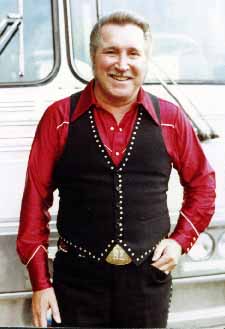Royce Kendall (Royce Kendall)

Royce Kendall
Culled from the album Let the Music Play, both father and daughter were drawn to the song from the start. As Royce later recalled: “We’d only played the thing once, and we remembered it. That’s a good sign . . . that’s the reason we cut it.” The song was originally the B-side to “Live and Let Live”, but deejays began playing “Heaven’s Just a Sin Away” instead. It went on to spend a month at the top of the country charts and netted the Kendalls awards from both the Country Music Association and the Academy of Country Music, and a Grammy.
Royce Kendall had originally performed alongside his brother Floyce as one half of a guitar-mandolin duo known as the Austin Brothers. They enjoyed only limited success and, after a spell in the army, Royce with his wife Melba settled in St Louis, where he worked as a barber.
Their daughter Jeannie started showing an interest in music whilst still in her early teens and the pair began to perform together locally. Their debut disc, “Round, Round, Round”, gained them some airplay and ultimately a deal with Pete Drake’s Nashville-based label Stop, but they had little empathy with the material they were offered – which included “Proud Mary” and “Leaving on a Jet Plane” – and the association proved short-lived.
Over the next few years they found themselves signed to, and then dropped by, both Dot and United Artists. In 1976, however, they met the producer Brian Fisher who had just moved to Nashville to establish Ovation Records’ country division. He brought them on board and they recorded Let the Music Play, their debut album for the label, in just one day. Their first single for their new label, a cover of Jimmy Work’s classic “Makin’ Believe”, had the misfortune to find itself pitched directly against a version of the same song by Emmylou Harris, and flopped.
However, their second, and more precisely its flip-side, catapulted both them and Ovation into the big time. In addition to its country success, it was played on pop and gospel radio; the Kendalls then were sent scores of song ideas featuring the words “heaven” and “sin” in the title. They followed “Heaven’s Just a Sin Away” with Curly Putman’s fine “It Don’t Feel Like Sinnin’ To Me” (1978) which reached No 2, “Pittsburgh Steelers” (1978) and then another chart-topper the same year, “Sweet Desire”, which was written by Jeannie Kendall. Subsequent hits included “Just like Real People” and “You’d Make an Angel Wanna Cheat” (both 1979) and “Put It Off Until Tomorrow” (1980), which had been written by Dolly Parton and her uncle Bill Owens.
Ovation’s 1981 bankruptcy in 1981 caused the Kendalls to move to the Mercury label, where the hits continued: “Teach Me to Cheat” (1981), “If You’re Waiting on Me (You’re Backing Up)” (1982) and, with additional harmony vocals courtesy of Emmylou Harris, “Precious Love” (1983). The following year they took Max D. Barnes and Robert John Jones’ “Thank God for the Radio”, now a classic, to the No 1 spot. As with “Heaven’s Just a Sin Away”,
Royce Kendall had felt good about the song from the off and despite the objections of their producer Blake Mevis, had insisted that they be allowed to cut it. It was to prove not only their final visit to the top of the charts but also to the Top Ten.
Born
- September, 25, 1934
- St. Louis, Missour
Died
- May, 22, 1998
- La Crosse, Wisconsin
Cause of Death
- Stroke
Cemetery
- White Oak Cemetery
- Harrison, Arkansas

